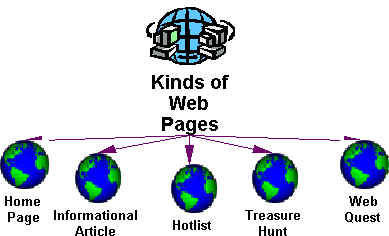
Home Page | Informational Article | Hotlist | Treasure Hunt | Web Quest
Most of the information on this page was copied directly from "Web authoring for Teachers" at: http://nbrick33.tripod.com/index.htm

Home Page | Informational Article | Hotlist | Treasure Hunt | Web Quest
A home page is like the cover of a book, it is
the "top" level of your web site.
It provides an overview of the content presented
within your web pages. If
possible, the entire home page of your site should
be viewed without scrolling.
All web pages should start with a Home Page. It
is the address you will give to
people when you tell them to visit your web site.
A Home Page should include the following information:
Title: Class/school name, grade, and location.
Description: A short statement describing the purpose of your web
page and
introducing yourself as the author. You will establish credibility by answering
the following
questions: Why did you create a web page? Where can you be contacted via
e-mail or
"snail mail"?
Table of Contents: By arranging a table of contents or menu format
you allow
browsers to link quickly and easily to the resources and information you
have gathered
and organized.
Visit these examples
Horticulture Careers at Anoka-Hennepin Technical College
http://www.ank.tec.mn.us/horticulture/
Mr. Lange's HomePage
http://www.minnetonka.k12.mn.us/SCHOOLS/groveland/lange/lange.html
Physics AP HomePage
http://www.gnsphysics.com/index.htm
Mr. Schutz's HomePage
http://ourworld.compuserve.com/homepages/davidschutz/Default.htm
Informational articles are research reports on a specific topic such as the American Revolution or the Amazon Rainforest. It is important to include a bibliography page listing the resources used to develop the report, this will lend credibility to your article.
Visit these examples
The Failure and the Promise of Technology in Education
http://www.gsh.org/teach/articles/promise.html
Rottweiler - AKC Breed Standard
http://www.akc.org/breeds/recbreeds/rotty.cfm
A hotlist offers a collection of sites that you find most useful and interesting to your curriculum units. Creating a hotlist will quickly point your students to appropriate sites so they do not spend hours of aimless surfing.
The list should include the Web Page Title, the address (URL), and a short description of what the students will find at the site.
Visit these examples:
Yu Ata No's Hotlist: Environment
- A starting point for people interested in conserving and preserving
our environment.
http://www.kn.pacbell.com/wired/filamentality/ex.hotlist.html
China on the Net - Visit
links that provide background information on Chinese culture, religion,
up to date news, and maps of the country.
http://www.kn.pacbell.com/wired/China/hotlist.html
Connecting Students - Links to web sites by topic
- Websites on elementary topics such as the American Revolution,
Body Systems and more.
http://www.connectingstudents.com/topic.htm
Educational Resources on the Web - A list of directories
containing lesson plans and many sites revolving around k-12 curriculum
http://www.members.tripod.com/~nbrick33/eddirectories.htm
A treasure hunt is an Internet based activity that takes a hotlist to the next level of learning. After developing a hotlist you pose one key question for each Web site you have linked to. The purpose is to have your students develop specific knowledge on the subject.
Abraham Lincoln Treasure Hunt Questions
http://www.siec.k12.in.us/~west/proj/lincoln/treasure.htm
Way Cool Science Scavenger Hunt
http://www.ced.appstate.edu/whs/goals2000/projects/97/karla/karla.htm
MLKing Scavenger Hunt
http://users.massed.net/~tstrong/Martin.htm
A WebQuest is an Internet based activity that usually covers several curriculum areas. WebQuests focus on using information rather than looking for it, students are prompted to go beyond just learning facts. Students usually compose creative work to support thinking at the levels of analysis, synthesis and evaluation.
For example, students may be asked to create a multimedia slide show that develops and supports a point of view. Another example could be students creating a newsletter to summarize their knowledge gathered on a topic. (The WebQuest Page)
Visit these examples:
Internet WebQuest: Crisis in Kosovo
http://homepages.luc.edu/~jgresse/kosovo.html
Women in Science
http://asterix.ednet.lsu.edu/~edtech/webquest/women.html
Elementary WebQuest: Animals of the Rainforest
http://www.plainfield.k12.in.us/hschool/webq/webq3/rain.htm
Webquest 101 - Putting Discovery into the Curriculum
- Work through an online tutorial and learn how to create your own webquest.
www.teachersfirst.com/summer/webquest/quest-a.shtml
Use this page to plan and organize your own WebQuest.
http://edweb.sdsu.edu/webquest/LessonTemplate.html
Visit the WebQuest Page - Authored by Bernie Dodge
the creator of the WebQuest. View a list of his suggested reading and training
materials, and browse a large database of existing Webquests.
http://edweb.sdsu.edu/webquest/webquest.html
back to Scot's WOW page | back to Scot's Education Links page